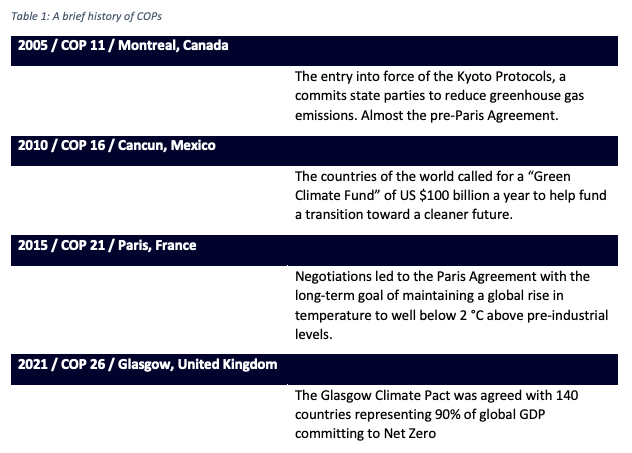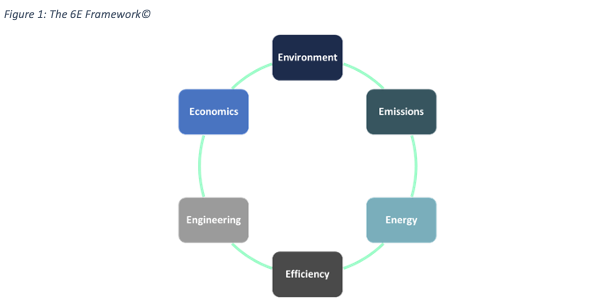Introducing the 6E Framework©
 Adam MacRae
Adam MacRae  November 8, 2022
November 8, 2022  Adam MacRae
Adam MacRae  November 8, 2022
November 8, 2022 At the southern tip of the Sinai Peninsula, Sharm El-Sheikh is undergoing a rapid transformation. Starting on November 06, this seaside town on the Red Sea has become the centre of the world’s fight against global warming, hosting the heads of state from 90 countries, representatives from over 190 countries, and 1,000s of delegates for the 27th Conference of Parties (COP27).
For this month’s Global Goals Insights Briefing, we thought we would do something a bit different by covering COP 27, highlighting what we do at Holocene Impact Capital (HIC), and to introduce our ‘6E Framework©’.
Otherwise known as the ‘United Nations Climate Change conference’, it is a meeting of nations held every year since 1995 to assess the progress made in dealing with climate change.
As a rule of thumb, every 5 COPs are meant to serve as a major event to broker a breakthrough in search of a new global agreement. In the years between the major milestones, the COPs serve as touchpoints to actually figure out how to achieve the new goals. Table 1 breaks down a few notable COPs from the past 20 years.

To say the hype leading up to COP 26 in Glasgow was ambitious, would be a massive understatement. In the weeks and months leading up to the summit, there were analysts and reports highlighting that it was the ‘last chance’ to save the world. In the end, it was a moderately successful summit.
In comparison, COP 27 in Sharm El-Sheikh has less lofty aspirations, though will prove much trickier to come away with a unified agreement. Instead of agreeing to pledges made at COP 26, COP 27 focuses on actions, and more importantly, how to fund the actions.
As the Economist argued this week, keeping global temperatures from rising 1.5 °C above pre-industrial levels is essentially over. What we must now do is aim for 2°C and be prepared to spend a lot of money to do so. Further, it will require investments not only in mitigation measures (reducing or removing CO2 from the atmosphere), but also adaptive measures (how to live in a warmer world).
Some estimates calculate the bill at USD $3 trillion a year. This is an especially tall order when the $100 billion per year from rich to poor nations committed at COP 16 never materialised. However, despite these tall numbers, it must be recognised that these are not only important investments but smart ones as well. Research has shown that for every $1 spent addressing climate change nets a return of $4 in benefits down the line.
At HIC, we launched in 2021 specifically to address this $3 trillion annual funding gap in both developed and emerging markets. As governments around the world fail to take the necessary steps to address climate change, the role of institutional and private capital is becoming ever more important. As capital advisors, we serve specialise in providing capital raising solutions for projects that look to address this energy transition for both new and existing projects around the world.
What sets us apart at HIC is we begin with impact. We start with the impact of a proposed project, identify what it is trying to address in the world (whether it be a specific UN Global Goal or initiative identified by a COP summit), and working back from there in the course of our research and due diligence. This impact-first philosophy allows us to take a more balanced and flexible approach to work on projects across the globe as well as across the value chain.
This approach and philosophy has been critical as we worked on numerous projects across the world and throughout the value chain. Some of the projects we have worked on include:
To support our work and our continual strive to focus on impact, we developed the 6E Framework©.

The framework serves as a useful guide that helps us capture the many dimensions and potential impacts (positive or negative) of a project. Below are a few examples of how each theme can be applied to any project.
Environment
Emissions
Energy
Efficiency
Engineering
Economics
If you would like to learn more about the work we do at HIC or how we can help your sustainable project get off the ground, get in touch by emailing info@holoceneic.com.